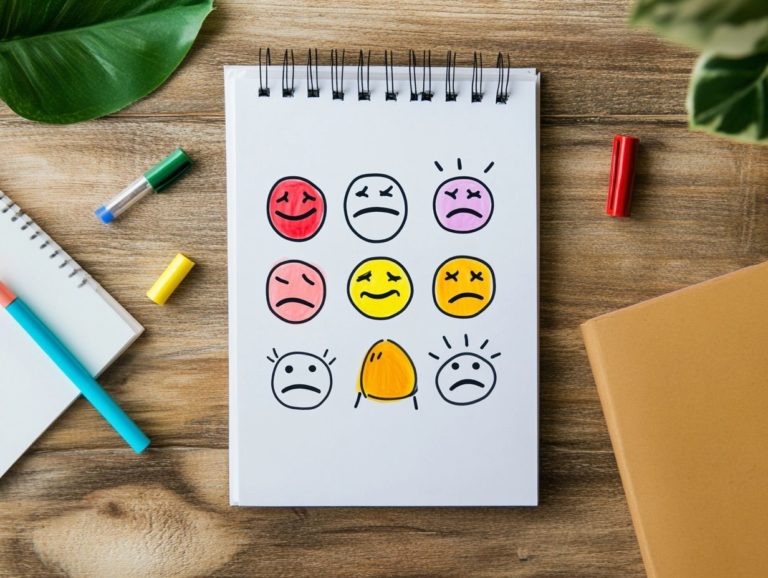5 Ways to Practice Emotional Awareness Daily
Emotional awareness and emotional intelligence are essential skills that can greatly enhance your mental health, self-monitoring, and relationships.
This article delves into five straightforward yet impactful strategies to cultivate emotional awareness and emotional growth daily, guiding you from a mindful check-in at the start of your day to emotional reflection at day’s end.
It also highlights the significance of understanding emotions, the advantages of mindfulness practices, and strategies for overcoming common obstacles that may impede your emotional insight and regulation.
Embark on this journey towards a more emotionally balanced life. Discover the transformative power of emotional awareness and intelligence skills.
Contents
- Key Takeaways
- 1. Start Your Day with a Mindful Check-In
- 2. Take Breaks Throughout the Day to Check in with Your Emotions
- 3. Engage in Activities That Help You Connect with Your Emotions
- 4. Master Mindful Breathing and Body Awareness
- 5. Start Reflecting on Your Emotions Today
- Why Is Emotional Awareness Important for Mental Health?
- What Are Some Tools and Techniques for Improving Emotional Awareness?
- How Can One Maintain Emotional Balance and Avoid Emotional Burnout?
- What Are Some Common Barriers to Emotional Awareness and How Can They Be Overcome?
- Frequently Asked Questions
- 1. What are 5 ways to practice emotional awareness daily?
- 2. How can mindful breathing help with emotional awareness?
- 3. Can journaling really improve emotional awareness?
- 4. Why is it important to pay attention to physical sensations for emotional awareness?
- 5. Is it necessary to talk to someone for emotional awareness?
- 6. How can mindful observation help with emotional awareness?
Key Takeaways

- Start each day with a mindful check-in to become aware of your emotions and triggers.
- Take breaks throughout the day to reflect on your emotions and engage in activities that promote emotional well-being.
- Practice mindful breathing and body scans to stay in tune with your emotional state.
1. Start Your Day with a Mindful Check-In
Start your day with a mindful check-in. This practice elevates your emotional awareness and sets a positive tone for the hours ahead.
By taking just a few moments to connect with your feelings, you cultivate awareness of your feelings and self-awareness skills. This allows you to recognize the triggers and responses that emerge throughout the day.
This practice boosts your ability to manage your feelings and enriches your emotional vocabulary and social skills. It deepens your understanding of your emotional landscape.
To conduct an effective mindful check-in, consider incorporating techniques such as mindfulness meditation and self-compassion.
Sitting in silence and focusing on your breath can unveil underlying feelings and thoughts. This approach encourages you to observe your emotions without judgment, granting you a clearer perspective on what drives your reactions.
With consistent practice, you ll gain deeper insights into your emotional patterns and behavior, enhancing your ability to manage stress and respond thoughtfully rather than impulsively.
Regularly acknowledging and processing your feelings can lead to more harmonious interpersonal relationships and create a supportive environment for your mental well-being.
2. Take Breaks Throughout the Day to Check in with Your Emotions
Taking breaks throughout your day to check in with your emotions can significantly enhance your emotional well-being and promote growth.
These intentional pauses provide you with the opportunity to reflect on your emotional triggers and assess your responses. This fosters a proactive approach to regulating your feelings and developing effective coping strategies.
One effective method for these check-ins is to utilize a feeling wheel for identification, which visually represents a spectrum of emotions. This helps you articulate your feelings with greater precision.
Alternatively, keeping a feeling list can serve as a quick reference guide, allowing you to identify your emotional states and encouraging deeper reflection.
By regularly engaging in these practices, you can improve your understanding of your feelings and insights, enhancing awareness of your feelings and responses.
This heightened awareness not only strengthens your interpersonal relationships but also supports better decision-making, as you become more attuned to how your emotions influence your choices throughout the day.
3. Engage in Activities That Help You Connect with Your Emotions
Are you ready to dive deep into your feelings? Engaging in activities that nurture emotional connection and expression can lead you to profound emotional insights and enhance your self-compassion.
Whether you choose to express yourself through art, journaling, or group activities, these experiences grant you the opportunity to explore your emotional state, facilitating a deeper understanding of your emotional responses and patterns.
Incorporating practices like art therapy or creative writing can significantly enrich this journey. Art therapy offers a non-verbal outlet, allowing you to express feelings that may be challenging to articulate, thereby promoting healing through creativity.
Similarly, creative writing invites you to reflect on your experiences and emotions, transforming often chaotic thoughts into structured narratives. These activities not only assist you in navigating complex emotions but also help build emotional resilience.
They equip you with the skills necessary for better emotional management and self-management in everyday life. Embracing these practices can foster a deeper connection to yourself and enhance your emotional well-being and emotional control.
4. Master Mindful Breathing and Body Awareness

Practicing mindful breathing and body scans can be pivotal in enhancing your emotional regulation and self-management. Rooted in mindfulness meditation, these techniques ground you while promoting emotional awareness.
They equip you with ways to handle emotions to navigate emotional challenges and emotional health. When you focus on your breath, you create a space for reflection.
This allows you to notice physical sensations and emotional states without judgment. Starting with simple deep breaths slowly inhaling through your nose and gently exhaling through your mouth you can cultivate a sense of calm and presence.
Once you ve settled into your breath, conducting a body scan can further deepen your practice. By systematically directing your attention to each area of your body, you encourage a fuller understanding of how your emotions manifest physically.
Over time, these practices enable you to identify emotional triggers more effectively, regulate your responses, and foster resilience. Ultimately, this enriches your overall emotional health and coping.
5. Start Reflecting on Your Emotions Today
Reflecting on your emotions at the end of the day is a powerful practice that can yield profound insights and foster emotional growth. By taking the time to review your emotional experiences, you gain a clearer understanding of how your emotional responses influence your relationships, decision-making, and motivation.
Engaging in practices such as journaling or confiding in a trusted friend can significantly elevate this reflective journey. Journaling provides a safe haven for you to articulate your feelings.
This allows for a deeper exploration of your emotions that can unveil invaluable insights. On the other hand, sharing your thoughts with someone who listens without judgment can offer emotional feedback and support.
It helps to clarify your thoughts and enhance your self-awareness. This continuous loop of reflection and feedback not only aids you in recognizing patterns in your emotional responses but also promotes ongoing emotional improvement.
Additionally, it is essential for personal development and cultivating healthier interpersonal connections.
Why Is Emotional Awareness Important for Mental Health?
Emotional awareness is a cornerstone of emotional intelligence. It plays a critical role in your mental health. When you understand and recognize your emotions, you pave the way for better emotional regulation and enhanced coping strategies. This awareness ultimately improves your overall well-being.
This understanding allows you to navigate emotional challenges effectively, fostering resilience and cultivating positive emotions and experiences. Experts like Devon Frye emphasize that being in tune with your feelings not only facilitates personal growth but also strengthens your interpersonal relationships and social skills.
Research indicates that individuals with high emotional intelligence tend to communicate more effectively and resolve conflicts amicably. They are also likely to make decisions that positively impact their lives and the lives of those around them.
As your emotional awareness heightens, it fosters empathy and understanding, enabling you to forge deeper connections with others. Countless individuals experience a remarkable reduction in stress and anxiety when they embrace this practice, underscoring the profound impact emotional intelligence and emotional learning have on mental health and overall life satisfaction.
What Are the Benefits of Practicing Emotional Awareness?
Practicing emotional awareness brings a wealth of benefits your way. These benefits include heightened emotional intelligence, improved emotional well-being, and greater resilience.
This practice supports your emotional growth by enabling you to recognize and understand your emotional patterns. It allows you to respond thoughtfully rather than react impulsively to emotional triggers.
By cultivating this awareness, you can effectively manage stress. You replace knee-jerk reactions with more considered responses. For instance, if you notice feelings of frustration arising during a challenging project, you might take a moment to pause and assess your emotions.
Instead of letting anger take the wheel and affect your emotional interactions, you actively seek solutions. This emotional insight significantly enhances your relationships. When you grasp your emotions, your communication becomes more effective, fostering deeper connections.
In a professional environment, such awareness is invaluable for navigating conflicts and enhancing teamwork. It ultimately drives both your personal success and that of your team through improved emotional understanding.
How Can Emotional Awareness Help in Relationships?

Emotional awareness is essential for fostering strong emotional connections and empathy in your relationships. By understanding your own emotional responses and those of others, you can navigate interpersonal dynamics with finesse. This leads to building healthier and more supportive connections through emotional communication.
This heightened emotional self-awareness gives you the power to recognize emotional triggers. This allows you to respond thoughtfully rather than react impulsively. For example, during a disagreement, when you are emotionally aware, you can identify your frustration.
You can take a moment to appreciate the other person’s perspective, rather than letting the conflict escalate. In a professional setting, a manager who senses a team member’s anxiety creates a supportive environment. This encourages open dialogue and emotional support.
Ultimately, cultivating emotional awareness enhances your communication skills and deepens your understanding of others. It paves the way for resolution instead of resentment and fosters better relationships.
Start practicing emotional awareness today. Embrace its power to transform your mental health and relationships!
What Are Some Tools and Techniques for Improving Emotional Awareness?
You have a wealth of tools and techniques at your disposal to enhance your emotional awareness. Options include mindfulness meditation, the feeling wheel, and structured feeling identification exercises. These resources empower you to expand your emotional vocabulary and improve your emotional literacy.
This leads to a richer understanding of your emotional landscape and emotional patterns. Develop a heightened state of emotional awareness today by incorporating mindfulness meditation into your routine. This practice allows you to observe your emotions without judgment.
Creating a valuable space for emotional reflection and thoughtful response instead of impulsive reaction significantly improves your emotional regulation. The feeling wheel acts as a visual guide, helping you accurately identify and articulate your emotions.
Ultimately, this facilitates better emotional communication and understanding with others. Structured feeling identification exercises offer a framework for recognizing and labeling your emotions in real-time.
This significantly enhances how you connect with others and your emotional intelligence skills. Together, these tools support the growth of your emotional intelligence, which is essential for overall well-being.
They allow you to navigate your emotional journey with enhanced clarity, emotional resilience, and motivation.
How Can One Maintain Emotional Balance and Avoid Emotional Burnout?
Maintaining emotional balance is crucial for your overall well-being and can serve as a robust defense against emotional burnout. By employing emotional regulation techniques and effective self-management strategies, you can navigate stressors while safeguarding your emotional health.
To achieve this balance, it s vital to set clear boundaries that protect your personal space and energy. Engaging in regular self-care activities whether it’s taking moments for mindfulness, indulging in hobbies, practicing self-compassion, or simply disconnecting from digital distractions can profoundly elevate your mood.
Embracing coping strategies, such as journaling or practicing deep breathing exercises, will facilitate a more grounded emotional state. Schedule regular emotional check-ins to promote self-awareness and emotional stability.
These check-ins give you the power to assess your feelings and make necessary adjustments to enhance your emotional health.
What Are Some Common Barriers to Emotional Awareness and How Can They Be Overcome?
Common barriers to your emotional awareness include societal stigma, personal emotional challenges, and deeply ingrained triggers that obstruct your path to self-discovery. To rise above these obstacles, it s essential to cultivate your self-awareness skills.
Embrace practices that enhance your emotional well-being and emotional intelligence. You may find yourself grappling with the fear of vulnerability, which often prevents you from expressing your feelings openly.
Many people lack the emotional education needed to navigate their own experiences and those of others effectively. This can hinder emotional growth and emotional expression.
To tackle these issues, consider creating safe spaces for open dialogue. Encourage discussions about emotions without fear of judgment.
Seeking out workshops or resources that focus on emotional intelligence can empower you to sharpen your emotional intelligence skills and social skills.
By taking these steps, you not only enhance your personal growth but also contribute to a supportive environment. This allows everyone involved to become more attuned to their emotional landscapes and the feelings of those around them.
Fostering better emotional connection and empathy is essential.
Frequently Asked Questions

1. What are 5 ways to practice emotional awareness daily?
- Mindful Breathing: Take a few minutes each day to focus on your breath. Notice any emotions that arise.
- Journaling: Writing down your thoughts and feelings helps you become aware of your emotions and patterns.
- Body Scan: Pay attention to physical sensations in your body for insights into your emotions. (A body scan is a technique where you focus on different parts of your body to notice sensations).
- Talking to a Trusted Friend or Therapist: Sharing your emotions with someone you trust can help you process and understand them better.
- Mindful Observation: Observe your surroundings and how they make you feel, without judgment.
2. How can mindful breathing help with emotional awareness?
Mindful breathing involves focusing on your breath and being present. This practice helps you recognize your emotions by creating space for them to arise. It also helps you observe your thoughts and reactions without getting caught up, enabling you to manage your emotions better.
3. Can journaling really improve emotional awareness?
Yes, journaling is a powerful tool for enhancing emotional awareness. By putting your thoughts and feelings on paper, you gain insights into your emotions and patterns. It provides a safe space to process and reflect on your feelings.
4. Why is it important to pay attention to physical sensations for emotional awareness?
Emotions manifest in physical sensations, like tension or a racing heart. By being aware of these sensations, you can better understand your emotions and their effects. This awareness also helps you tune into your body for better emotional management.
5. Is it necessary to talk to someone for emotional awareness?
While it might not be essential, talking to a trusted friend or therapist can be incredibly helpful! It allows you to express and process your emotions in a supportive environment, providing new perspectives and insights for emotional growth.
6. How can mindful observation help with emotional awareness?
Mindful observation is about noticing your surroundings without judgment. This practice helps you become aware of your emotions by focusing on the present moment and your feelings. It lets you step back and view your emotions from a more objective perspective, aiding emotional insights and regulation.






